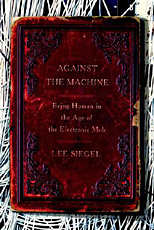Lee Siegel is the author of the essay collections Falling Upwards and Not Remotely Controlled. In 2002, he received the National Magazine Award for Reviews and Criticism. In this hard-hitting work, he dives into the many ways in which the Internet has changed the way we live. Siegel is willing to concede that this technological tool has made things more convenient for us: we use it to shop, play, work, search for information and love, make connections with others. At the end of his introduction, the author states:
"The Internet has penetrated our lives more deeply than any other medium; it has far surpassed even television in its intimacy and immediacy. It deserves to be challenged by the same fundamental questions once posed to other revolutionary media."
The Internet enables human beings "for the first time in history" to have thousands of experiences without leaving home; we can lead as many secret lives as we are able to fabricate; and we can send out opinions, beliefs, and images of our flesh to thousands of strangers around the world. Siegel's point is well-taken: our public and private life has been radically transformed by the web. Another point is also accurate: many of the Internet's biggest boosters are those who are making lots of money off it. The online retail giant is growing, and conglomerates now own vast social-networking sites like MySpace and YouTube. Those who regularly use the Internet are willing to see everything as entertainment.
According to the author, "popularity is Web culture's Holy Grail." We're all back in high school, it seems, trying to be liked by others; imitation is the best kind of flattery. Self-expression is all the rage on the web, and mass thinking has become the lowest common denominator in the online culture. He also is not a big fan of the phenomenon of full viewer participation where TV, websites, karaoke, and video games all beckon us to step into the scene:
"Restless, impatient, acquisitive, we don’t have the time or the mental space to passively allow an aesthetic experience to sweep us into its newness, or its strangeness. We want to jump right in and help do the work of creation. We want access."
Siegel calls this a journey into "the Youniverse" where imagination is eclipsed by ego gratification. Its most vile side is represented by mash-up artists, reviewers on Amazon, "citizen journalists," and amateur movie critics who trash what they don't like and ridicule writers with different opinions. Not everyone will agree with Siegel's "view of the machine," but there is plenty here to think about and discuss with others — perhaps even online.
